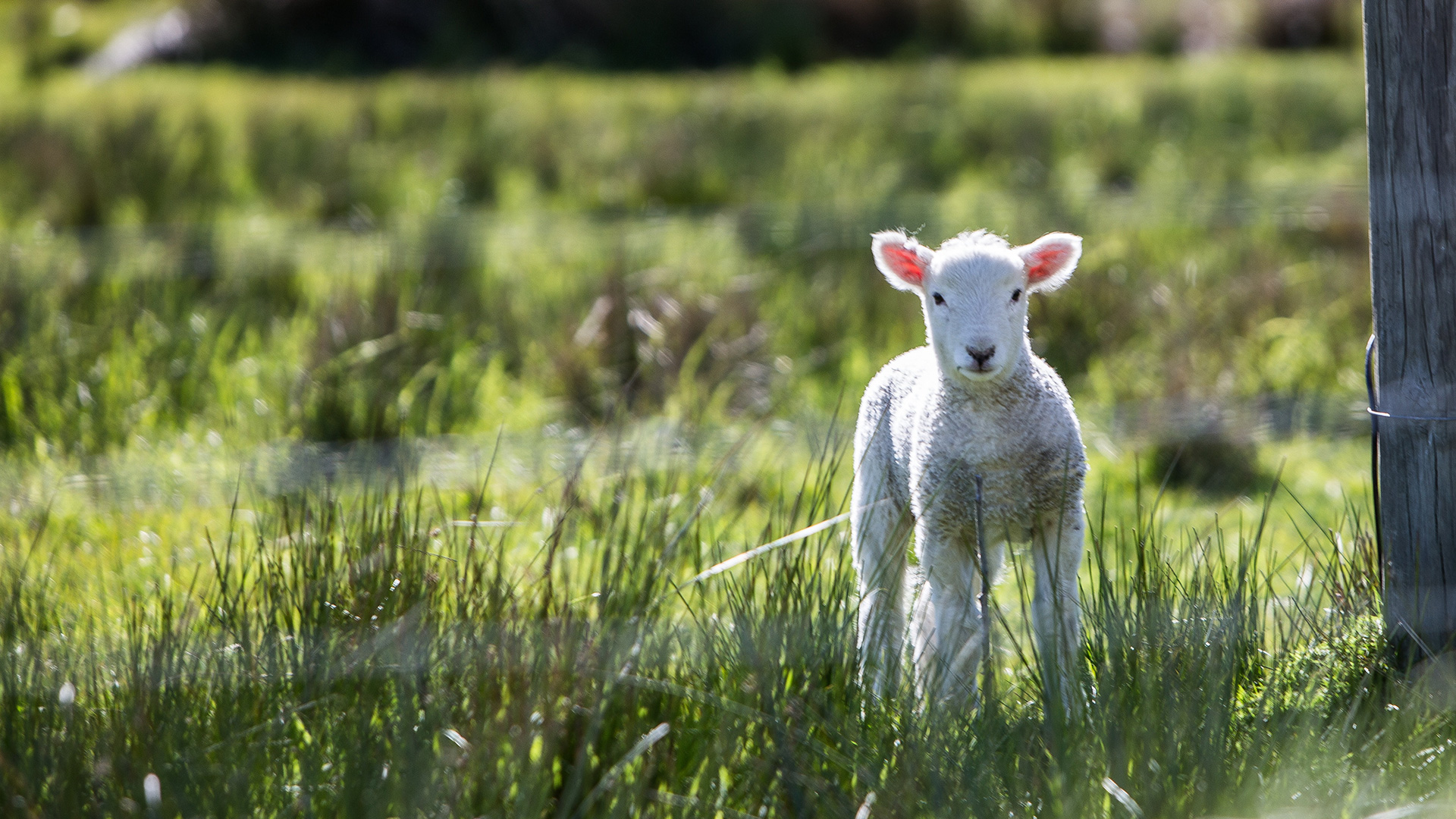Separation can be frightening. When a child wanders off in a busy store and becomes separated from their parents, it often ends in tears and a cry for help: “I’m lost!” Fear races through that young mind wondering, “Will I ever find them?” and “What will happen to me?” Yet, this pales in comparison to the dramatic pictures of separation from God in the Bible.
Jesus described the final separation on judgment day with various illustrations. He pictured the separation of wheat from the chaff (Matthew 3:11, Luke 3:17) and wheat from the weeds (Matthew 13:24–30). Perhaps the most famous reference is the separation of the sheep and the goats (Matthew 25:31–46).
Jesus spoke about what will happen at the end of the age (Matthew 24). He reinforced that message with parables (Matthew 25). The first, the parable of the ten virgins, encourages us to be ready for judgment day. The parable of the talents encourages us to be faithful in the use of the gifts he’s given as a thankful response to his love. Finally, in the last words of Jesus’ teaching ministry, Jesus shares the basis of the separation: faith in him.
The Separation
When the Son of man shall come in his glory, and all the holy angels with him, then shall he sit upon the throne of his glory: And before him shall be gathered all nations: and he shall separate them one from another, as a shepherd divideth his sheep from the goats: And he shall set the sheep on his right hand, but the goats on the left.
Matthew 25:31–33
Jesus consistently used sheep as a picture to describe believers. Sheep wander (Isaiah 53:6) and are helpless (Matthew 9:36); they trust in their shepherd for all their needs (Isaiah 40:11). It was common in Jesus’ day for sheep and goats to graze together during the day, then the shepherd would separate them at night. Jesus, the Good Shepherd, will do the same on judgment day. (Read Ezekiel 34:11–24 for a parallel account). There are only two divisions: believers and unbelievers. There is no middle ground. Either eternal life in God’s presence, or separation from God forever.
Many readers skip to what follows and completely miss the parable’s point. Before any mention of works, the judgment is already made on the basis of faith. “He that believeth on him is not condemned: but he that believeth not is condemned already” (John 3:18). This separation itself is the act of judgment, the verdict. What follows is the evidence.
Astonishment of the Sheep
Then shall the King say unto them on his right hand, Come, ye blessed of my Father, inherit the kingdom prepared for you from the foundation of the world: For I was an hungred, and ye gave me meat: I was thirsty, and ye gave me drink: I was a stranger, and ye took me in: Naked, and ye clothed me: I was sick, and ye visited me: I was in prison, and ye came unto me. Then shall the righteous answer him, saying, Lord, when saw we thee an hungred, and fed thee? or thirsty, and gave thee drink? When saw we thee a stranger, and took thee in? or naked, and clothed thee? Or when saw we thee sick, or in prison, and came unto thee? And the King shall answer and say unto them, Verily I say unto you, Inasmuch as ye have done it unto one of the least of these my brethren, ye have done it unto me.
Matthew 25:34–40
Did you notice there is no mention of any sin? This is not because the believers never sinned “for all have sinned” (Romans 3:23). Jesus took the punishment for sin, so they are forgiven. Despite believers falling short of perfection (Matthew 5:48), they are described here as righteous (25:46). This is true because Jesus lived a perfect life to cover us in his righteousness (Isaiah 61:10). Through faith in Jesus as their substitute believers receive all that is needed to be welcomed into Heavenly Father’s presence forever.
Jesus describes receiving this as an inheritance. Typically, an inheritance is not earned by one’s action but received based on a relationship. (While there could be exceptions among families here on earth, the Bible teaches any inheritance from God is always a gift). A faith relationship in Jesus makes us co-heirs with Christ (Romans 8:17).
What follows is startling for believers, leaving them astonished. Jesus takes note of their works. Clearly, they weren’t parading their efforts to seek credit—they don’t even remember doing these things! Yet anything done for “the least of these”—even seemingly insignificant actions—was done for Christ. “We love him, because he first loved us” (1 John 4:19). The reason believers don’t realize their actions is because they were selfless and sacrificial, shaped by God’s unconditional love for them.
Imagine waking up and finding the ground wet. It is evidence of rain. The wet ground didn’t cause the rain; it is the result. So, too, with believers. These are not works of merit but evidence of faith. They were not done with any thought for personal gain, which is why believers are joyfully surprised. Believers do works out of joy for everything they already have in Christ. The works of a believer, done without expecting anything in return, are so beautiful to God because they are a genuine response to his love.
Empty Excuses of the Goats
Then shall he say also unto them on the left hand, Depart from me, ye cursed, into everlasting fire, prepared for the devil and his angels: For I was an hungred, and ye gave me no meat: I was thirsty, and ye gave me no drink: I was a stranger, and ye took me not in: naked, and ye clothed me not: sick, and in prison, and ye visited me not. Then shall they also answer him, saying, Lord, when saw we thee an hungred, or athirst, or a stranger, or naked, or sick, or in prison, and did not minister unto thee? Then shall he answer them, saying, Verily I say unto you, Inasmuch as ye did it not to one of the least of these, ye did it not to me.
Matthew 25:41–45
Not all will be saved. Clever goats, too proud to fall on God’s mercy, imagine they can stand before God on their own works. They have been keeping score and believe God now owes them. This betrays a self-focused motivation rather than fitting Christ’s description of being done completely out of faith and love for him. Their works may have gained the favor of others as “good,” but without faith in Christ, the stain of sin remains. God sees the works of goats as disgusting “filthy rags” (Isaiah 64:6). Their lack of true good works shows no evidence of faith. And “without faith, it is impossible to please God” (Hebrews 11:6).
Goats reject trust in Christ alone, choosing to trust also in themselves. They insist on having God judge them on their own, sinful, broken record. What a terrifying thought! Even a single sin is a great offense before a holy God. Jesus now reads off an entire series of their offenses.
During this life, they downplayed sin as “mistakes,” foolishly thinking God would look the other way or sweep their sin under the rug. Then, when confronted with their sinful record, they try to defend themselves in vain, knowing their empty excuses fall flat. They are still in their sins. God is just in cursing them: “Cursed is every one that continueth not in all things which are written in the book of the law to do them” (Galatians 3:10).
What will follow is the worst possible separation. “Depart from me” (Matthew 25:41) are the most horrifying words someone could ever hear from God. It means being cast from God’s presence forever, the very essence of hell. To emphasize its nature further, Jesus describes it as “everlasting fire, prepared for the devil and his angels” (Matthew 25:41). This separation of hell lasts forever.
See Also: Can a Loving God Send Someone to Hell?
Where Is Your Trust?
And these shall go away into everlasting punishment: but the righteous into life eternal.
Matthew 25:46
Separation is frightening. When a little child is lost, fear grips their heart until they are reunited with their parent. Goats already experience this separation and, as a result, are often unsure and even afraid of what will happen to them on judgment day. This fear is for good reason—they are about to meet their judge! Trusting in themselves, they hope they are good enough.
This parable provides a solemn warning. Before any mention of works, the separation has already taken place. The sheep and the goats are separated on the basis of their faith in Christ alone—or not.
What a stark contrast for believers! They have no need to fear judgment day. They look forward to it! It is the day they will receive their inheritance. Trusting in Christ alone, they already know the outcome, so they lift their heads confidently. Jesus comes not as a condemning judge for them but as their Good Shepherd coming to take them home.
Believers don’t fear separation from God. That’s because, like that young child holding the hand of their Father, they enjoy his presence right now. “He that believeth on me hath everlasting life” (John 6:47). Through faith in Christ alone, you can too!

Scripture Study Tools
Free Access
Enter your email below for immediate access to our entire library of Scripture Study Tools, including printables, phone wallpapers and guided Scripture studies.
Additional Questions You Might Have

What is the Bible?
The Bible is an amazing collection of 66 books recorded over sixteen centuries by over forty writers.


